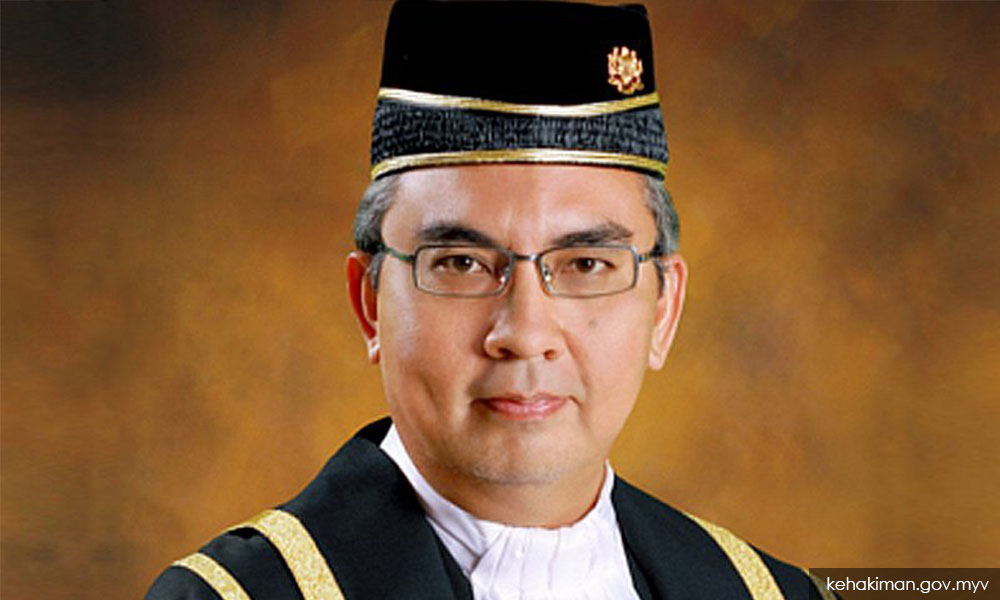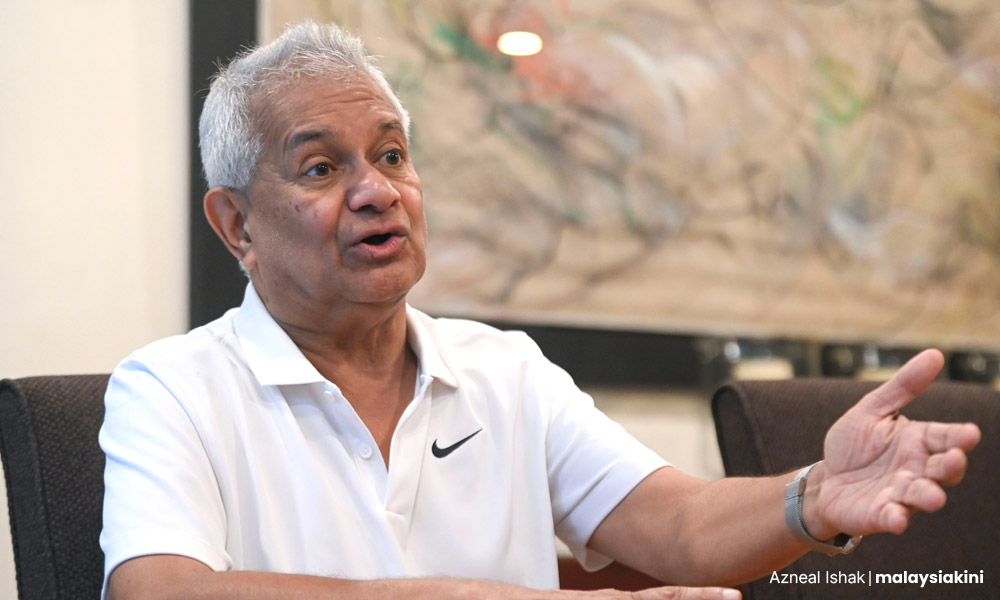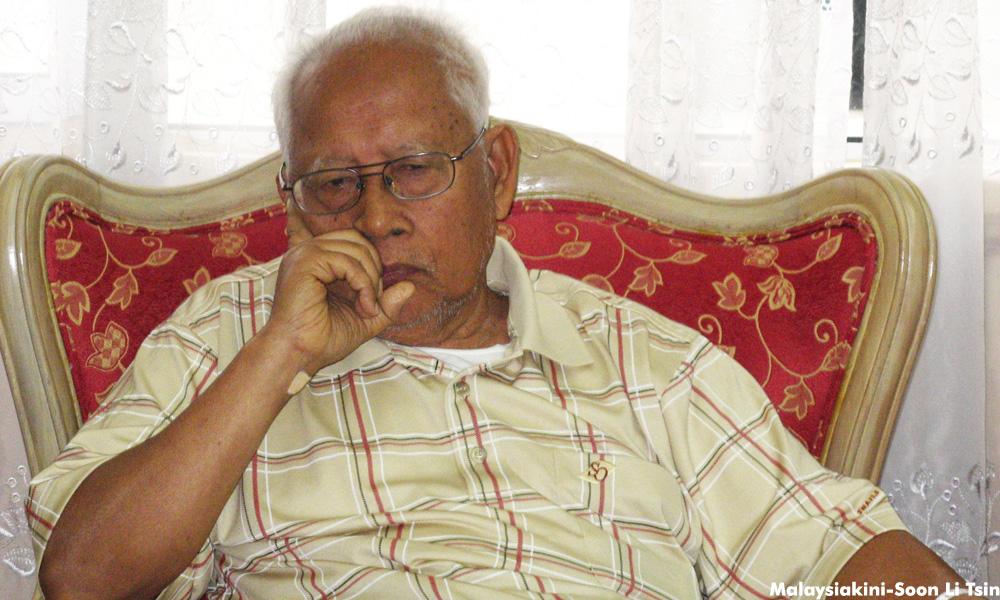EXCLUSIVE | In the third part of an exclusive interview with former attorney-general Tommy Thomas speaks about the implications of the Federal Court decision on Najib Abdul Razak’s RM42 million SRC International case and the importance of judicial independence.
Malaysiakini: What is your opinion on the overall Federal Court decision and the process?
Tommy Thomas: The Federal Court had no option. You cannot hold the Federal Court to ransom or blackmail the court. I’m sorry, this is an adversarial system. I always use a sporting analogy. You come for a game of badminton in the finals, and one team does not want to play, complaining about the referee. The match is over - it is forfeited.
So Najib got a fair and unbiased trial?
Absolutely! Throughout! Of course! There is no doubt in my mind.
Then how could he go around, in the face of overwhelming evidence, saying that he is innocent…? In fact, (Najib Razak’s lawyer Muhammad) Shafee (Abdullah) addressed the Umno assembly and said the RM42 million came from Arab donors.
You have to separate the two of them. Most legal systems are more tolerant of the accused. So Jack the Ripper can go to his grave saying “I am innocent” and the law would say, “That is your view”, the court found him guilty. The court normally does not overreact to laypersons’ opinions. If they continue to think they are innocent when they are found guilty, the court does not get too excited.
But it is a totally different thing for lawyers because lawyers have a different standard. Lawyers have to, in Malaysia, comply with the Legal Profession Act, our etiquette rules, and all our professional obligations. Which is why the Malaysian Bar president said the Bar would be lodging disciplinary proceedings against all these lawyers to the DB (Advocates and Solicitors Disciplinary Board). Because lawyers have different standards.
That is why I said if you had mentioned (in part 2 of the interview) this possibility to Commonwealth lawyers or judges two weeks ago before it (the Federal Court hearing) occurred, they would say, “No, nobody behaves like that.” Hence, it is without precedent.
In your book, you say the longer the case drags, more people would feel frustrated about the process. Many have said, for this case, that if Najib was guilty, why isn’t he in jail yet? And part of the reason is because at the High Court level, Justice (Mohd) Nazlan (Mohd Ghazali) allowed the stay of execution on the 12-year jail term and RM210 million in fine, which allowed him to roam (free) even though he was convicted. Do you think the stay was validly given for such a high-profile, serious white-collar crime? If it wasn’t allowed, would that have changed public opinion to feel that justice has been served?
I call this ‘post-conviction bail’, and I think Justice Nazlan, whom I appeared before many times, and with the greatest of respect, wrote a splendid judgment and is a wonderful judge - one of the best judges, and the attacks on him were unfair - but in my opinion, he made one error. Which was, after conviction and sentencing - people forget it was actually 72 years on all seven counts where he was found guilty, and RM210 million fine - he gave bail. I think that was a mistake. I said that then, and I think with the benefit of hindsight, Justice Nazlan himself may admit to it now. As a result of giving him bail, the attack on the judge personally in the last six months has been totally unacceptable.

Secondly, the equality provision. If the equality provision was raised in the post-conviction bail scenario, the courts could have ruled that such a serious offence does not warrant bail. If bail had been denied, and he had gone in, he would have stayed in until the Court of Appeal and Federal Court appeals. The damage to the Malaysian body politic in the last two years could have been avoided.
I lived through the Harun Idris prosecution. Harun Idris’s case was in the late 70s, and he was one of Malaysia’s most powerful warlords - the prime ministers of the day were afraid of him. Besides Harun Idris, there was Mokhtar Hashim, and then Anwar Ibrahim - none of them shook the Malaysian body politic when they were charged or convicted. Of course, they made a fuss about it, they said it was a political trial but their lawyers all behaved professionally. Most significantly, our political environment was never destabilised, as occurred in the recent past.
I cannot help but feel that our system seems to still have differentiation in how we treated Najib even from the beginning. You wrote that, under ordinary circumstances, we would see Najib brought to court in orange jumpsuits in handcuffs, but MACC decided not to. Then later, they allowed bail in instalments, which was unusual, and recently, Anwar (Ibrahim) said that he was pretty sure the prison would treat Najib better compared to an ordinary convict. It seems like this is something quite entrenched, that the notion of equality before the law is something we are fearful to enforce.
I agree with you entirely. At least the judges, (apart from the exception of Justice Nazlan on the issue of bail), I think they were all conscious about it. In their judgments, they talked about Article 8 and equality, that is the judiciary at the three levels.
But the rest of the public service, the MACC, the police, the prisons, they are still very feudal in their mind. So much has been written about feudalism in Malaysia, in politics. This is not an original comment I am making. So, this is feudalism in action. They find it difficult. They cannot think of equality. They have placed their leaders on a pedestal, and that is the population’s problem.
What can we do? The politicians benefit. But if the people don’t put them on a pedestal, they would not be on a pedestal. So it is cultural - it is part of Malaysian society.
At the heart of this case, this is a simple case of a public official misappropriating a certain sum of money into his bank account and spending it. Why do you think our system has allowed this to happen?
It is a Malaysian structural problem. It is a result of concentration of power in the Prime Minister’s Office. Well from Merdeka, the Tunku (Abdul Rahman) was a powerful prime minister, it continued under Tun (Abdul) Razak (Hussein, Najib’s father and the second prime minister). Dr M (Mahathir Mohamad) was certainly an authoritarian prime minister.
So when Najib became the sixth prime minister, there was so much power in the office of the prime minister, and then he [also] became the minister of finance - more power. And by that time, the state was very much involved in the economics and business activities of the country. The GLCs (government-linked companies), Khazanah (Nasional Bhd, the sovereign wealth fund), and Petronas (the national oil company): the state had its tentacles all over - the state means the prime minister. The prime minister and/or the finance minister appoints and removes the GLCs bosses. So everybody was scared of the prime minister.

Take KWAP (civil services pension fund, Kumpulan Wang Persaraan), for example, there is no doubt that the KWAP chairman, board of directors, who were all appointed by Najib, would not dare to say “no” to him. Because if they say no, they would be removed. And they did not.
Such overriding power would be abused, which is why you must have checks and balances, and power being defused and shared.
You mentioned the Harun Idris case. I remember the judge in that case was Eusoffe Abdoolcader, who you regard as one of the best judges we’ve ever had. In the SRC case, we have good judges, like Justice Nazlan and (chief justice) Tengku Maimun (Tuan Mat) too. How much do you think the outcome of the conviction of the former prime minister happened due to the forces of personality of judges we had, rather than the judicial system being independent, and thus the system can be relied on regardless of which judge, and we would’ve arrived at the same outcome?
When Harun Idris was charged, it was during the glory days of our judiciary. We had Tun Suffian (Hashim) as Lord President - probably the best we ever had - and then Raja Azlan Shah as Chief Justice of Malaya, and Justice Eusoffe doing the trial. They are three of our best judges in the 20th century, pre- and post-Merdeka. That is a relevant factor.
Then we come to Justice Nazlan here (at the SRC trial) and the Court of Appeal and Federal Court – they are all strong judges, certainly the chief justice and the others at the Federal Court. The ladies (female judges), in particular, are very good. They are top class. Indeed, they are world-class jurists, very brave and principled. So I think that was certainly a factor.
Whether others would have risen to the occasion is a matter of speculation. I don’t know, but certainly a focus on the personalities on both occasions is warranted. In mature legal systems, like the UK that has the common law system for a thousand years, the standard and expectation on judges are high; many competent judges would be expected to reach the right conclusion (in a case like this) because the system is like a big oak tree - though faults and errors certainly do exist. But developing countries don’t have that yet. Our systems are not 100 or 200 years old, so it takes a long time. Hence personalities matter.
To have judicial independence, you need two elements, one is the legal safeguards put in place, and second, the DNA of the judges there. I was wondering for the first one, do you think we have sufficient legal safeguards against political interference? The reason I asked is because of the news of Umno holding special meetings that criticised (Prime Minister) Ismail Sabri (Yaakob) for not interfering in cases like SRC, on the assumption that they can.
Historically, Umno presidents were always prime ministers and certainly during Anwar’s trials there was a perception that judges like Eusoff Chin, who were direct beneficiaries of the 1988 judicial crisis, thought they were indebted [to the politicians]. People forget that one of the consequences of the 1988 judicial crisis was the politicisation of the judiciary, in the sense that the judges realised, if they don’t “play ball”, there could be a repeat of Salleh Abas [who was sacked], so that was very much what the politicians wanted to achieve.

So move forward 30, 40 years later, Umno, which is so used to getting its way… Umno was showing its true colours last week. That was the Freudian slip because they thought that is still how the system works today. But it is not like this now. Certainly, nobody from Umno should be interfering. And kudos to the prime minister for not listening to them, and everybody else in the cabinet for not listening to silly demands like this. It is unconstitutional and constitutes contempt of court. It was brazen conduct by Umno and wholly unacceptable.
There will be many more Umno politicians on trial now like Ahmad Zahid Hamidi, Abdul Azeez (Abdul Rahim), Tengku Adnan Tengku Mansor, and even Rosmah (Mansor) is still on trial. What is your confidence level that justice would be served in these cases, or do you think there is a potential repeat of what we’ve seen before? Will justice be served under Umno?
So far as pending cases I started are concerned.
There has been nothing new once PN and Umno took over?
Not to my knowledge. They are strong cases, so I don’t see how [we would fail], using legal grounds. With strong witnesses and cogent documents and the facts, and the law is in our favour, we should succeed. Applying the legal test, we should succeed. I don’t see why the courts would not find in our favour as we got the better case. We are the better team in the adversarial system. We should win, so I am confident in those cases. Other cases, I don’t know. - Mkini



No comments:
Post a Comment
Note: Only a member of this blog may post a comment.